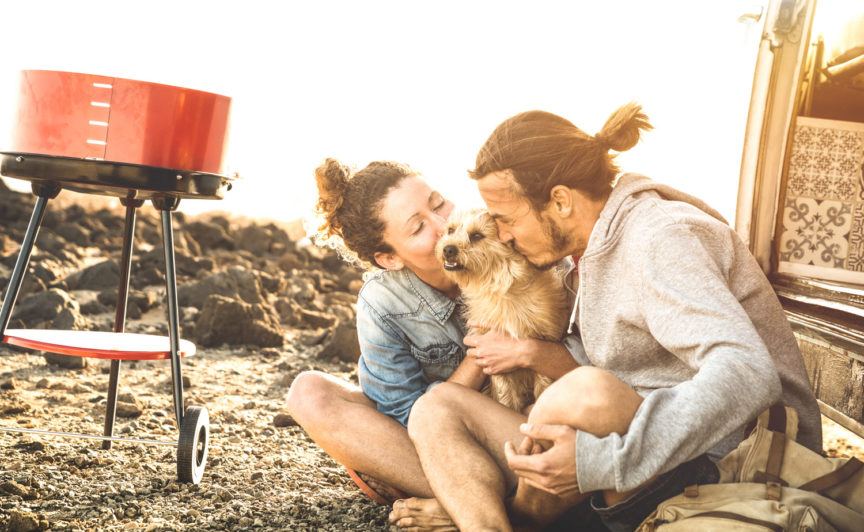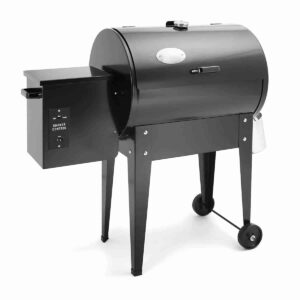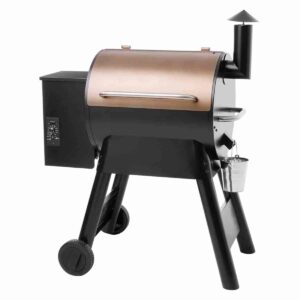One of the first things you should know when it comes to dogs ingesting charcoal is the difference between charcoal fuel for grilling and activated charcoal. The charcoal you use to grill with can be harmful to your dog. It is not deadly, but the toxins in it can cause an upset stomach. If your dog swallows or licks charcoal, you should monitor him or her closely.
If your dog does ingest something and get an upset stomach we recommend this supplement (from Amazon) to help. Please read and follow the instructions.
The first half of this article talks about grilling charcoal. If you’re interested in whether or not activated charcoal is good for dogs, as a medicine, scroll to the bottom of this article.
Is charcoal safe for dogs? It is not safe for dogs to eat or lick charcoal. The charcoal fuel has toxins, which can cause your dog to have an upset stomach.
This is not a deadly poison, but it can make your dog sick and uncomfortable. There is also the possibility that large pieces of charcoal can get lodged in the dog’s intestines and cause intestinal blockage. This makes for a more serious issue. (check out this summary of the degrees of toxicity by the ASPCA)
Activated charcoal is a medication used to treat people and animals who have ingested something harmful. The activated charcoal absorbs the toxins before they can reach the liver and cause damage to the organs. It is a good item to keep on hand in case you pet accidentally ingests somethings that could be harmful to him, though.
If you are unsure as to how much charcoal your dog has eaten or whether your dog is experiencing symptoms of poisoning, you should not hesitate to call your vet. The vet may have you simply monitor the animal or they may want you to bring him in. Always follow your vet’s instructions when it comes to treating a poisoning incident in your dog.
Is Charcoal Safe for Dogs?
There are several items used for grilling that are not safe for your dog to ingest. Aluminum foils and plastic wraps can lodge in your pet’s intestines, blocking the digestive system. Lighter fluid can also be poisonous and cause a reaction in dogs. The fluid inside charcoal can be harmful for pets.
Here is a list of ways to keep your dog safe around grilling and charcoal:
- Keep your dog at least 3 feet away from the grill
- Keep grilling tools out of reach of your dog
- Never leave bags of charcoal lying around
Keeping both pets and children at least 3 feet away from the grill at all times is a safe practice. Your grill should also be elevated above the ground, where your dog cannot gain access when you are not looking. Not only does keeping your dog away from the grill prevent poisoning from charcoal fluid. It can also keep your dog from getting burned on accident or experiencing eye irritation.
Grilling tools can have charcoal residue on them, so it is also a good practice to keep these out of reach of your dog. If he licks of the charcoal residue, he could become sick as a result. This is an easy precaution to take.
Also, washing your grilling tools right after use is a helpful safety measure. That way, if the dog does gain access, there is no charcoal fluid to be licked off of your utensils.
On a side note, your grill brush should always be kept out of the dog’s reach, as the metal bristles can become lodged in his tongue, throat, stomach lining, and intestines, if he ingests them. Not only that, but the brush will almost certainly have charcoal residue on the handles and bristles.
Charcoal is not a natural attractant to dogs, but there is the possibility that your adventurous dog could lick or eat the charcoal pellets, if you leave the bag lying around.
Depending on the amount ingested, this could lead to sickness. Always put your charcoal bag away in a place that your dog cannot reach, like in a cabinet.
While eating charcoal will probably not kill you dog, it can leave him with a very upset stomach. Larger pieces eaten whole can also cause intestinal blockage. Keeping charcoal out of his reach is an easy safety measure to take.
What Should I Do If My Dog Eats Charcoal?
While it is not the end of the world if your dog has eaten some charcoal on accident, it is a good idea to watch him closely and take action if he begins to get sick.
Here are some measures you should take if your dog has ingested charcoal:
- Give him plenty of water
- Begin a bland food diet
- Watch for signs of stomach irritation
- Consult your vet if problems escalate
If your dog has eaten charcoal, he will need plenty of water to flush it out of his system. In small doses, charcoal will not be harmful to your dog, but you want to do everything in your power to make sure he is okay.
Fill a large bowl with water, and monitor your dog’s drinking habits. Encourage him to drink the water to help flush out the toxins from the charcoal pellets he licked or ingested.
The fluid from the charcoal may upset your dog’s stomach. To minimize this problem, immediately begin a bland food diet for the next 24 hours. Give your dog his normal dry dog food, but avoid oily, greasy canned foods and dog treats, which may have flavored ingredients.
Monitor your dog. Watch for vomiting or diarrhea. If your dog normally has full run of the yard, you may want to walk him on a leash and stay close to monitor his bowel movements, until you are sure the charcoal has not upset his stomach.
If your dog vomits, has diarrhea, or refuses to eat or drink, it is time to call the vet. Follow your vet’s directions, chances are they will encourage you to feed your dog ice cubes and keep them in the loop over the phone.
If your vet requests that you bring your dog in for observation, do so immediately. The problem could be more severe if a large piece of charcoal has lodged in his intestines.
How Much Charcoal Can a Dog Have?
How much charcoal a dog can ingest without getting sick is going to depend on the size and health of the dog. There is no real way to measure how much charcoal a dog can have. A small taste or a couple of charcoal pellets will probably not harm your dog.
Here are some things you need to pay attention to in case you have to call the vet:
- How much charcoal did the dog ingest
- Did he simply lick the briquettes or eat whole pieces of charcoal
- Is he drinking water
- Does he refuse food
If you end up needing to call the vet, one of the first questions they will probably ask you is how much charcoal your dog ate.
It may be hard for you to tell exactly how much charcoal has been ingested, but come up with an educated guess. Look at the bag of charcoal, and see if there is a significant difference in the amount that is there now and the amount that was there before the dog got into the bag.
Know whether your dog simply licked the charcoal or charcoal covered grilling tools, or whether he chewed and ate whole briquettes.
This will make a difference in your vet’s treatment plan. For instance, the vet will probably be less alarmed if you tell them the dog only licked you charcoal-covered spatula rather than gorging himself on the bag of charcoal.
Pay attention to whether or not your dog is drinking water. If he is, the charcoal fluid will likely be quickly flushed from his system. If the dog refuses water, you can try feeding him ice cubes or giving him Gatorade. If you cannot get any fluids into your dog at all, then you know you have a problem. Consult your vet immediately, and make sure they know your dog is refusing liquids.
If your dog is not eating, he could be experiencing intestinal blockage. As with plastic wrap or aluminum foil, large pieces of charcoal can block the intestines. This will cause you dog to not want to eat.
If you see half-chewed charcoal briquettes in your bag of charcoal, this is another clue that your dog could have ingested larger amounts of charcoal and probably needs to go to the vet’s office.
How Can Activated Charcoal Help Dogs?
There is a difference between the charcoal you buy to fuel your grill and activated charcoal you may find at the pet store. Activated charcoal (link to Amazon) is used as a medication to absorb toxins your dog has ingested, before they reach his liver and damage his organs.
Below are a list of poisonous items to dogs, which may warrant the use of activated charcoal:
- Large amounts of charcoal
- Lighter fluid
- Over-the-counter medications
- Fabric softener
- Batteries
- Sugar-free gum and mints
- Grapes and raisins
We have already discussed the effects of large amounts of charcoal and lighter fluid on dogs.
Over-the-counter and prescription medications may also pose a threat. Dogs are not always treated with the same medications that humans are. Some medications are used for both humans and animals, but your dog would not require the same dosage as you.
If your dog swallows medications on accident, you should alert your vet and ask whether or not to administer activated charcoal.
Always follow your vet’s directions. If the vet tells you not to give activated charcoal, hold off and monitor your dog. Keep the vet aware of any updates in your dog’s condition.
The chemicals used to produce the fragrances in fabric softener and fabric softener sheets can poison your dog. Pay attention to how much fabric softener the dog has ingested. Chances are, this is a good time to administer activated charcoal. Have your vet on the phone for further directions.
The chemicals in batteries can be very harmful to pets and humans.
Your dog does not necessarily have to swallow the whole battery to experience adverse effects. Chewing on the battery can release the harmful chemicals into the dog’s mouth. Always keep batteries out of reach of your pets.
Sugar free gums and mints contain a chemical called Xylitol. It is harmless to humans but can be deadly if a pet ingests it.
Xylitol causes dangerously low blood sugar in animals. Never give your dog sugar-free human food. If he ingests some on accident, it may be time to administer activated charcoal.
Grapes and raisins are also toxic to dogs. These should be kept out of your dog’s reach. If your dog accidentally gets into grapes or raisins, alert your vet, and stand by with the activated charcoal.
Activated charcoal may be something you want to consider keeping around your home at all times. It can be purchased at any pet store.
If you follow the directions on the bag, you can even administer activated charcoal for gas and mild indigestion, in addition to pet poisoning. Be alert for the signs of pet poisoning. Your pet may have eaten something toxic, even if you were unaware when it happened.
Here are some signs of pet poisoning:
- Vomiting
- Diarrhea
- Upset stomach
- Lethargy
- No appetite
- Drooling
- Strange behavior
- Excessive thirst
- Excessive urination
- Weakness
If your dog is presenting with any of these signs, but you are not sure what they have ingested, it is safe to go ahead and administer activated charcoal. The activated charcoal will not hurt your pet. Be sure to call the vet.
Let them know what signs the dog is presenting with and how much activated charcoal you have administered. The vet may want you to bring your dog in for monitoring.
There is also a National Poison Control Helpline you can call if you believe your pet is demonstrating signs of having ingested poison. The number is 1-800-222-1222. You can call this number for any reason, at any time. It is better to be safe than sorry.
The helpful associates on the other end of this line can often tell you whether or not what your pet has ingested warrants a trip to the vet or the use of activated charcoal. Know ahead of time that they will lean toward the side of caution and will send you to the vet if they believe there is any real threat to your dog’s health.
If you are going to administer activated charcoal to your dog, you should know the best way how.
The recommended dose of activated charcoal is 1-3 grams per kilogram of body weight. You should repeat doses every 4-8 hours, using half of the original dose. Be sure to follow the directions on the bag and only give your dog as much activated charcoal as is recommended for his body weight.
Activated charcoal can be given orally or through a stomach tube. If a stomach tube is needed, chances are you are already in your vet’s office.
This is not something that can be done at home. If you are administering activated charcoal orally, the best way to do it is to tilt the dogs head back slightly. Hold his jaws apart, and squirt the activated charcoal in with a syringe.
Be sure to keep the dog’s head tilted back until he has swallowed all of the activated charcoal. Otherwise, he may spit it out.
Then you will be unsure as to how much of the dose he received. Have another person help you if you are having trouble getting your dog to cooperate. If you simply cannot get your dog to take the medication orally, your vet may have to put in a stomach tube.
When grilling, you should always take precautions regarding your pets. Keep out of reach anything that has the potential to be poisonous or to cause intestinal blockage in your dog.
If your dog accidentally ingests something such as charcoal, monitor him closely. If he shows signs of an upset stomach or presents with any other poisoning symptoms, contact your vet.
If your dog has eaten something he should not have and your vet directs you to administer activated charcoal, do so with the dog’s head tilted back, so that he receives the full dose.
Know that grilling charcoal and activated charcoal are not the same thing. One is harmful, and the other can be helpful under the right set of circumstances.
The chemicals within charcoal for grilling can be toxic for your dog. They may cause symptoms of an upset stomach and make your dog uncomfortable. Activated charcoal is not toxic. It is a medication engineered to rid the body of toxic matter. It is a good idea to keep some at home in case your dog swallows something he should not.
If your dog will not eat or drink, there is the chance he is experiencing intestinal blockage.
Consult your vet immediately and get your dog into the office. He may need an operation, or it may be necessary to administer activated charcoal through a stomach tube, rather than orally. Always follow your vet’s instructions when it comes to toxic items your pet may have ingested.
Check out our Recent Posts
Z Grills Review
If you’re looking for a grill that will last, Z Grills is the way to go. Z grills are made of the best quality materials...
Read MorePit Boss Pellet Grill Review
Pit Boss is one of many when it comes to manufacturers of wood pellet grills and smokers. If you have spent any amount of time...
Read More10 Fun Benefits of Taking an Online Cooking Class
There’s never been a better time to take an online cooking class. With the continued popularity of online learning, there are more and more exciting...
Read More



